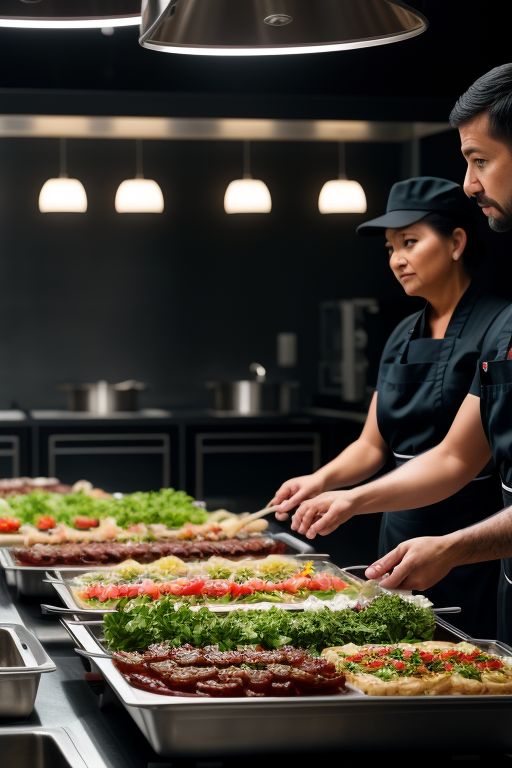In the context of film, television, and live event productions, a Catering Team is responsible for providing meals and refreshments for the cast and crew. Their role is crucial in ensuring that everyone on set or at the event is well-fed and hydrated, contributing to the overall morale and productivity of the production team. This article delves into the diverse responsibilities of a Catering Team, highlighting their significance, required skills, and the impact they have on the overall success of a production.
The Role of a Catering Team
A Catering Team manages all aspects of meal and refreshment provision during a production. They work closely with production coordinators and location managers to ensure that the dietary needs of the cast and crew are met and that meals are delivered on time. Here’s a detailed look at their key responsibilities:
- Menu Planning and Coordination
- Menu Development: The Catering Team creates a menu that caters to the dietary preferences and restrictions of the cast and crew. This includes options for vegetarian, vegan, gluten-free, and other special dietary needs.
- Meal Scheduling: They coordinate with the production schedule to plan meal times, ensuring that breakfast, lunch, dinner, and snacks are served at appropriate times without disrupting the production workflow.
- Logistical Coordination: The team works with production coordinators to determine the best locations for meal setup, taking into account convenience and accessibility for all team members.
- Food Preparation and Delivery
- Meal Preparation: The Catering Team prepares meals in accordance with the planned menu. This involves cooking, baking, and assembling various dishes to be served.
- On-Site Cooking: Depending on the production’s location, the team may cook meals on-site using portable kitchen equipment or in designated kitchen facilities.
- Food Delivery: They ensure that meals are delivered to the set or event location on time and are kept at the appropriate temperature until served. This includes setting up buffet lines or individually plated meals.
- Service and Clean-Up
- Meal Service: The Catering Team serves meals to the cast and crew, ensuring that everyone receives their food promptly. They also provide refreshments and snacks throughout the day.
- Clean-Up: After meals, the team is responsible for cleaning up the dining area, disposing of waste, and ensuring that the space is left tidy and ready for the next meal service.
- Health and Safety: They adhere to strict health and safety standards, ensuring that all food is prepared and served in a hygienic manner to prevent foodborne illnesses.
- Special Requests and Dietary Needs
- Dietary Accommodations: The Catering Team takes note of any special dietary requests and ensures that these needs are met. This includes providing alternative meals and ensuring that food allergies are carefully managed.
- Personal Preferences: They also consider personal preferences and try to accommodate individual tastes to the best of their ability.
- Inventory and Supply Management
- Supply Ordering: The team is responsible for ordering all necessary food supplies, beverages, and kitchen equipment. They ensure that there is enough stock to meet the needs of the production.
- Inventory Management: They manage inventory levels, track usage, and ensure that supplies are replenished as needed. This involves maintaining records of food consumption and waste.
Key Skills Required for a Catering Team
Being an effective Catering Team requires a combination of culinary skills, organizational abilities, and strong customer service. Here are some of the most critical skills needed:
- Culinary Expertise: Proficiency in cooking and food preparation is essential to create a variety of meals that meet diverse dietary needs.
- Organization: Strong organizational skills are required to plan menus, schedule meals, and manage inventory effectively.
- Time Management: The ability to manage time efficiently is crucial to ensure that meals are prepared and served on schedule.
- Customer Service: Excellent customer service skills help ensure that the cast and crew feel well-cared for and that their dietary needs are met.
- Adaptability: The ability to adapt to changing schedules, locations, and dietary requirements is important for managing the dynamic nature of production environments.
The Impact of a Catering Team
The work of a Catering Team significantly impacts the well-being and productivity of the cast and crew. Here are some ways they make a significant impact:
- Morale Boost: Providing high-quality meals and refreshments boosts morale and keeps the cast and crew energized and focused.
- Productivity: Well-fed team members are more productive and able to maintain high energy levels throughout long production days.
- Health and Safety: Ensuring that dietary needs are met and that food is prepared hygienically helps maintain the health and safety of the team.
- Efficiency: Efficient meal service helps keep the production on schedule, minimizing downtime and disruptions.
The Catering Team’s Workflow
To understand the role of a Catering Team, it’s essential to look at their workflow in detail, from menu planning to clean-up.
- Pre-Production Phase
- Menu Planning: Develop a menu that caters to dietary preferences and restrictions.
- Logistical Coordination: Coordinate meal times and locations with the production schedule.
- Production Phase
- Meal Preparation: Prepare meals according to the planned menu.
- On-Site Cooking: Cook meals on-site if necessary.
- Food Delivery: Ensure timely delivery and proper temperature maintenance of meals.
- Meal Service: Serve meals and provide refreshments and snacks.
- Clean-Up: Clean up the dining area and maintain hygiene standards.
- Post-Production Phase
- Inventory Management: Track food consumption and manage supplies.
- Feedback Collection: Gather feedback from the cast and crew to improve future services.
Real-World Examples of Catering Teams
To illustrate the impact and responsibilities of Catering Teams, let’s look at some real-world examples:
- Film Production
- Role: In film productions, Catering Teams provide meals for the cast and crew on set. They manage meal times to fit the shooting schedule and ensure that everyone is well-fed throughout long filming days.
- Challenges: Film productions often involve long hours and remote locations, requiring the team to be adaptable and resourceful in meal preparation and delivery.
- Television Shows
- Role: For television shows, Catering Teams provide daily meals and snacks for the cast and crew. They coordinate closely with production schedules to ensure timely meal service.
- Challenges: TV productions typically have tight schedules and frequent breaks, requiring efficient meal service and quick turnaround times.
- Live Events
- Role: In live events, such as concerts or award shows, Catering Teams provide meals and refreshments for performers, crew, and VIP guests. They ensure that food is available throughout the event and handle any special requests.
- Challenges: Live events are fast-paced and dynamic, requiring the team to manage large volumes of food and provide quick service.
- Corporate Productions
- Role: For corporate productions, such as conferences or promotional events, Catering Teams provide meals and snacks for attendees and staff. They ensure that food options are suitable for professional settings and meet dietary needs.
- Challenges: Corporate events often require a higher level of formality and presentation, necessitating attention to detail and high-quality service.
Conclusion
The role of a Catering Team is multifaceted and essential to the success of any production. Catering Teams are responsible for providing meals and refreshments that keep the cast and crew energized, satisfied, and focused on their work. Their responsibilities span menu planning, food preparation, service, clean-up, and inventory management, requiring a unique blend of culinary skills, organization, and customer service.
Catering Teams play a crucial role in maintaining the well-being and productivity of the production team. Their work ensures that everyone on set or at the event





